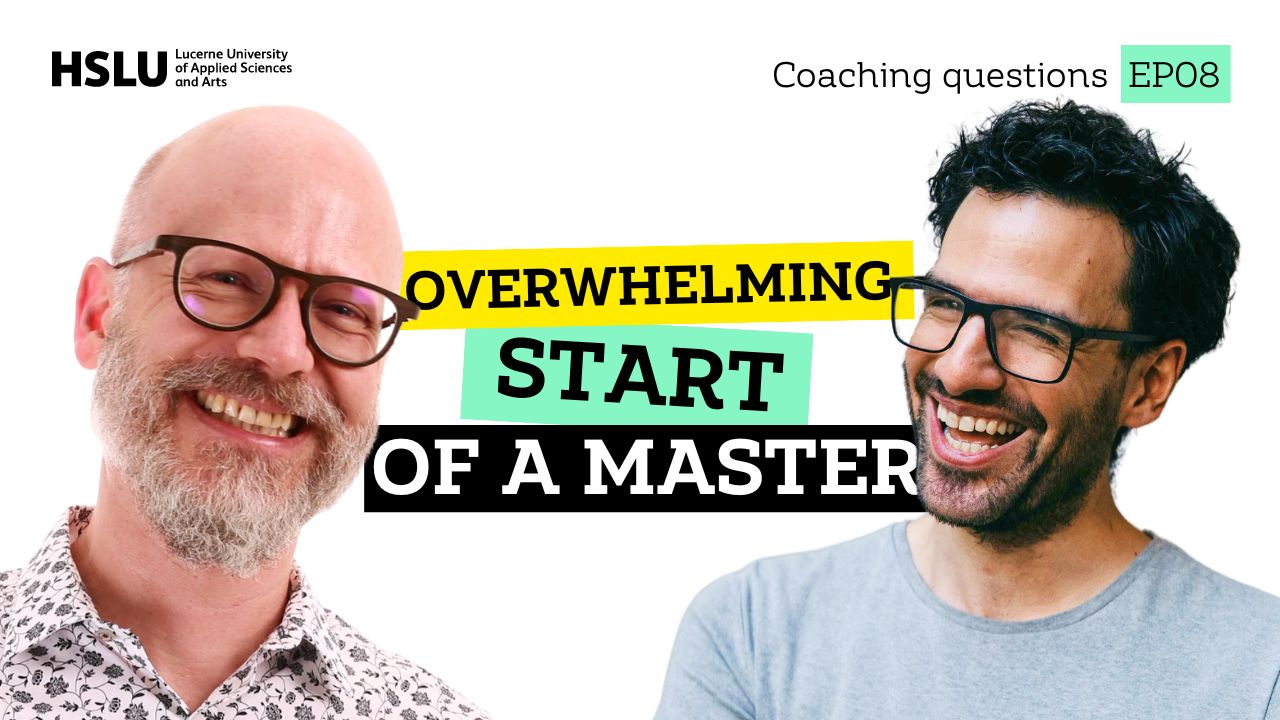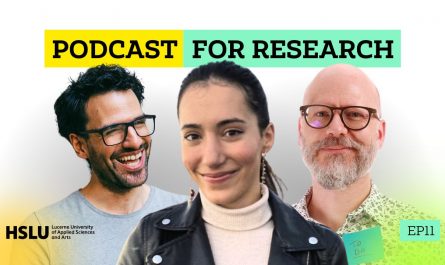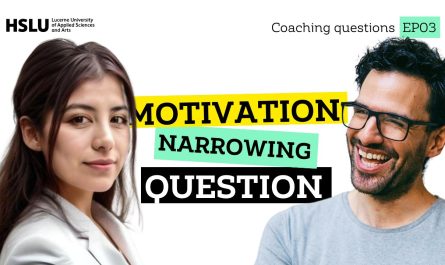It’s the start of the Master in Service Design for the first year students. Starting a new program can feel overwhelming. In fact, it is a bit like starting a new life.
In this conversation with Andy Polaine, co-lead of the Master Service Design, we explore:
- Reasons: Why is the start of a Master program so overwhelming.
- What we do: How we design routines to help bring to the surface those emotions.
- What you can do: 4 practical tips that anyone going through a big life change can steal to better cope with the anxiety and feeling of being overwhelmed.
- Opportunity: 1 beautiful opportunity that is hidden in all this difficulty.
Video transcript
This transcript was fully generated using Descript. The transcript wasn’t corrected. Which means it can be pretty creative, funny or wrong at moments.
Introduction
Daniele: So Andy, big pleasure to see you once more today. it was the start of the semester for our first year students in the Master Service Design within the HSLU. And first year is not just the start of a new program. When you start a new program, it comes with a lot of new things. In fact, we could even say it’s the start of a new life. So my question to you is:
How can students, who start this new life, better deal with it?
Andy: I think the first thing is to just recognize it’s happening. I think there is this sense of I’m starting this new program. It’s all exciting. And hopefully it’s all exciting.
We did this new ritual, which we’re going to start doing every week, which is the emotional weather report. You know, how are you doing? And actually for all of us, pretty much, it was kind of mixed, right? It was sort of partly cloudy, partly rainy, partly sunny. one of those spring days where it’s sort of hail, snow, sun, and.
rain all in one go and a lot of anxiety mixed in with that excitement and trepidation is the good English word for that.
I think it’s important to recognize you’re not just starting a new course, for some people it may have been, they’ve given up a job that they’ve been doing previously to start this, or they’ve gone into the, from bachelor’s into a master’s.
To move to a new country is pretty stressful, to move to a new city is quite stressful, to start a new master’s is pretty stressful, on top of it all. And for some people, it’s got the language thing too, right? they’ve got to live in a country and learn another language plus all the just general overhead you mentioned.
So I think it’s really important to mention There’s a whole sort of cognitive and emotional overhead going on there. Which means that your sort of maximum is going to be much less than it might normally be once you’ve got used to it and everything. by maximum, I mean, you know, maximum attention, maximum energy and all of that stuff is probably going to be sort of 60, 70%.
Rather than, you know, 90.
I start to worry if people hit a hundred.
, So recognizing it, is one of the ways of coping because it takes the stigma out of feeling. I shouldn’t be feeling this way. I just need to get on with it. And I’m just, I’m going to ignore all of that stuff.
Daniele: Indeed, it reminds me of two situations. One, which is the design squiggle, where it’s very messy at the start and then slowly it gets to a place where it’s more structured, less uncertainty., Once you present in chaotic Start of projects, the design squiggle, , there is kind of a magic that happens where people feel like, ah, it’s normal.it’s okay that I feel like that. This is what should happen. It’s not great that I feel like that, but it’s normal.
And this reminds me on another thing, which kind of saved my life for these past four years, which was a nurse.
When we had, this preparation course when a baby is about to come. And that nurse said one thing, which was very interesting. She said, just for you to know, the first four years. These are hell and they’re going to be hell for your couple. So whenever you are in that tension, when you feel this is all going to shit, just remember that statistic, which is 80 percent of people feel overwhelmed by that. And it’s in the four years and that’s perfectly normal. And there were really times where with my wife, we had this conversation of, hey, just don’t shit. But it’s normal, okay? That’s what they told us, so we’re not doing anything wrong here. I think just acknowledging that, having a sketch, being it a statistic that just reassures, helps so much.
Andy: Yeah, I’ve definitely done that with clients and with teaching as well, which is to say, there’s going to be a moment in this workshop. We’re going to feel really confused and feel like we’re not getting anywhere and it’s all going to start to get anxious.
Or there’s going to be a moment over the period of these courses where you’re going to feel like you don’t know what’s going on. I really like the expression the messy middle in projects or in research, because it also describes this stage where, we’re going to go through that mess.
And we’re in the middle of it, but we will come out the other side. And again, really good to signpost that stuff up front because you can just point back to it when people are really anxious and go, you know, I said that was going to happen. This is the moment. And it normalizes it.
And we’ve both been through these experiences of living in other countries, and other cultures, from your own experience, going through that. Is there something that you did back then that now you reflect back on and you say, Oh, that was actually quite smart.
I think there’s two things, maybe. When you move to another country, one is you realize you really have to make an effort to make friends, especially as an adult. students have a built in structure that they see people every day that they work with. And that’s one of the really nice things about studying together.
As an older adult, you might meet parents from your kid’s school but otherwise you almost have to go on dates with friends to kind of see whether, is this a person who I want to have friendship with? And kind of make that same amount of effort.
I was a bit surprised by the loneliness, I guess, when I’ve moved countries. The second thing is probably to find a routine. I think routines can help quite a lot. Find your commute, find your favorite cafe and all that stuff. Because then it starts to make you feel you kind of have arrived.
I think the last thing is my experience has been, It takes a year. I think it takes more than a year, actually just over a year to feel like you’ve arrived because it’s as stuff starts repeating again. Oh, this is my second Christmas. This is my second summer. You feel like, okay, this is familiar now.
up until that time, the entire first year, everything is new, Until you go through the whole cycle of seasons.
Daniele: Yeah, I love how this idea of being able to say the first year is going to be this novelty, overwhelming phase. And then as life repeats itself every year, there will be a sense of home, of safety of certainty that will slowly come.
Andy: When you’re studying, they’ll have it also in the next semester, the second semester. Oh, it’s semester start again, I know how this works. But they’ll also have it when they move into the second year and you have that moment of, Oh God, I’ve got second year now and all this stuff’s new.
But when I look at these new people coming in, I remember what it was like to be like that. And suddenly you feel like, one of the older kids.
Daniele: You know, I’m a deeply optimistic, maybe a bit over optimistic guy, even in that struggle, I see that there is some beauty in it.
In my own experience, there was this moment where I had to change either region or country. And as someone who is an introvert, it was a moment where I could reinvent the way I work with people. That type of interaction that doesn’t work for me. So let me try something new now. This is a nice opportunity for people to try out new ways of making friends, new types of relationships. and that’s obviously a bit hard, but also very, very interesting. You recognize more who you are and you try out to get that version of yourself a bit more out instead of just sticking with how you grew up. I can start fresh.
Andy: Yeah, absolutely. I’ve had that a few times. The nice thing about moving to another country, particularly where you don’t know anyone, is you don’t know anyone. And so you get to do that reinvention of yourself.
I remember having this fantasy when I first went to Australia that I was going to just tell everyone that my nickname was something and, just invent it, right? Because no one knows. you don’t have any of those people around you, sort of close friends and families or people you’ve worked with before who kind of pigeonhole you with all your baggage.
you can just come and be someone new.
I think this also relates to the work we do. I’m just preparing my keynote for the Service Design Global Conference and the title is, it’s not business, it’s personal.
And it sort of rails against the idea of, it’s not person, it’s just business. Because I think it’s the other way around. I think we do pretend that being professional means to cut off all your emotions and just be very formal and all those things. But when I speak to people, particularly my coachees, all of the problems they’re having, all my coachees this week have had people problems.
There’s no one really struggling with structural stuff. It’s all like really messy people stuff with different colleagues that they’re working with. And that’s a real strain. And so I think a lot of the stuff we’re doing when we’re working on things that involve organizational change. Push people into really uncomfortable space, which is incidentally what we’re also doing to our students, right?
As you learn, you get pushed into an uncomfortable space, hopefully safe space, but still it’s uncomfortable, it’s unfamiliar. if you don’t recognize the human aspect of what’s going on there and what that does to people, it can be really problematic. You can often never really achieve what you’re trying to achieve.
Summary
Thanks
Daniele: so much, Andy. I think there was a lot of valuable, tiny tips in there. Definitely the aspect of recognizing the aspect of also seeing the opportunity in here for change and also remembering that this is all personal and that the emotions have a place in all of this.
So as this new academic year is starting, I’m super excited that we both get the chance to play, and discover these new students and continue our journey with the older students that know all of it and, have reinvented themselves for this new year.
Andy: I’m looking forward to it.



